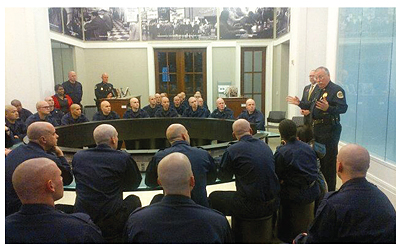Learning from History | Diversity 2016
Nashville Public Library
Law enforcement officers learn historical context on civil rights straight from the (primary) source
 Police bias against people of color, particularly black people, has been one of the most heated issues of the past few years, with killings by officers of unarmed black people in cities across the country serving as the impetus behind the formation of the Black Lives Matter movement. Some might think there’s not much role for libraries in fixing this problem, beyond helping users find reliable data and texts that address it.
Police bias against people of color, particularly black people, has been one of the most heated issues of the past few years, with killings by officers of unarmed black people in cities across the country serving as the impetus behind the formation of the Black Lives Matter movement. Some might think there’s not much role for libraries in fixing this problem, beyond helping users find reliable data and texts that address it.
Yet the Nashville Public Library (NPL)—and the Metro Nashville Police Department—together are taking a far more proactive approach.
Civil collaboration
In spring 2015, Nashville police chief Steve Anderson and his training team contacted NPL about providing historical perspective and context to the police department’s new recruits on Nashville’s history with the civil rights movement. The department’s training team and the library’s programming staff worked together to set goals, and then library staff built out the program.
Andrea Blackman, division manager for NPL’s Special Collections Division, tells LJ, “We decided to look at the role of law enforcement in the 1950s and 1960s and use that as a lens [on] current issues without saying we’re looking at the postracial, post-Obama, post–Trayvon Martin era. But we knew the conversations would get there, because they always do.”
While the program took a long time to grow, the library didn’t have to start from scratch. “The program is built upon a decade of public programming around our civil rights room and civil rights collection,” says Blackman. “The room opened in 2003 to be a venue and a voice for scholarly research but also to have public conversations—community dialog—around what is the next civil rights issue of our time. We’ve always brought groups of people together to talk about race and equity.”

AT THE TABLE Nashville police trainees in NPL’s Civil Rights Room.
Photo courtesy of Nashville PL
Now, Nashville police trainees attend “Civil Rights and a Civil Society: Civil Rights Training for Nashville Enforcement Agencies and Beyond” at the Civil Rights Room of NPL. The training, which won a 2016 Urban Libraries Council Top Innovators Award, uses the archival images, oral histories, and film footage housed there. As of this summer, some 400 Metro police trainees, supervisors, and Tennessee Bureau of Investigation (TBI) agents had completed the course.
Growing up and out
This fall, the program received a $25,000 grant from Nissan (whose American operations are headquartered in nearby Franklin, TN) through the library foundation to formalize and replicate the training, expanding its reach beyond local and state law enforcement to community and school groups and other cities.
As of this writing, it has provided programming experiences/training for 817 people, mostly adults: 167 civilians (students, nonprofits, community groups, and government employees) and 650 law enforcement, Blackman says.
Police departments nationwide are interested in adapting the training to their own locales. Blackman says she’s been invited to come to cities such as Baltimore, San Antonio, and Charleston, SC.
To help replicate and expand the offerings, NPL is developing three complementary deliverables: strategies for law enforcement conversations, a dialog manual for community conversations, and a curriculum for schools, which Blackman compares to the Ferguson syllabus, a crowdsourced collection of scholarly resources to help teach about the Ferguson, MO, police shooting of Michael Brown and the public outcry in response. NPL is piloting material for syllabi with local colleges.
All three are supported by the richness of NPL’s special collections—oral histories, pamphlets, buttons, etc. Blackman hopes that, as well as promoting greater understanding, the program will “highlight some of those hidden treasures.” Though these items are not yet digitized, Blackman says NPL plans to make them available online so that those implementing the curricula elsewhere will have access to the supporting material. However, ultimately it may be the local history of the host library that hits the hardest. Says Blackman, “We will be talking with a particular city about how to use their local narrative as a gateway to having these conversations.”
Is it working?
Measuring the impact of a program like this is tricky at best. Blackman says the library uses surveys, gathers feedback both qualitative and quantitative, and is starting to employ benchmarks. But, she says, comparisons to another city would miss the point. Rather, the library is looking at individual knowledge, skills, and value systems—as Blackman recalls a Nashville police lieutenant said when the program began, how attendees “are using those lessons every day to build a more tolerant, empathic police department.”
Perhaps the ultimate indicator of the program’s success is what hasn’t happened. “If we’re able to have these conversations now,” says Blackman, “then maybe we’ll have a system in place [in which] law enforcement and citizens can collaborate and talk, and maybe we won’t become a city with an uprising.”
 READ ALL DIVERSITY 2016 ARTICLES:
READ ALL DIVERSITY 2016 ARTICLES: - Aspiration to Action
- Q & A with Katrina M. Sanders
- Building Equity from the Ground Up (Los Angeles County Public Library)
- Learning from History (Nashville Public Library)
- Coming Together Around a Divided Past (Johnson County Public Library, KS)
- Reworking the Workforce (St. Paul Public Library)
- Experience Success (ACRL Diversity Alliance)
RELATED
ALREADY A SUBSCRIBER? LOG IN
We are currently offering this content for free. Sign up now to activate your personal profile, where you can save articles for future viewing









Add Comment :-
Comment Policy:
Comment should not be empty !!!